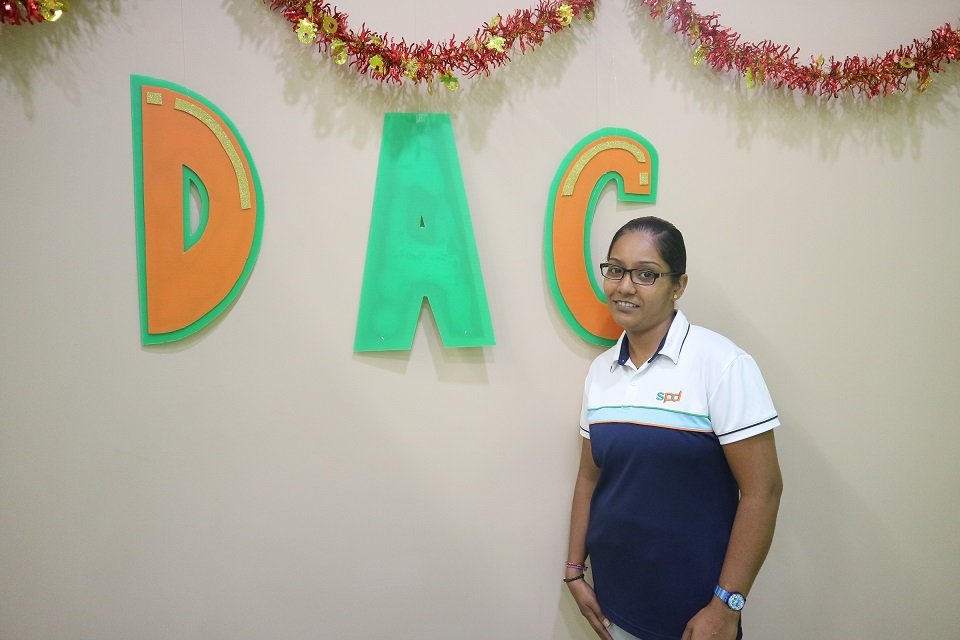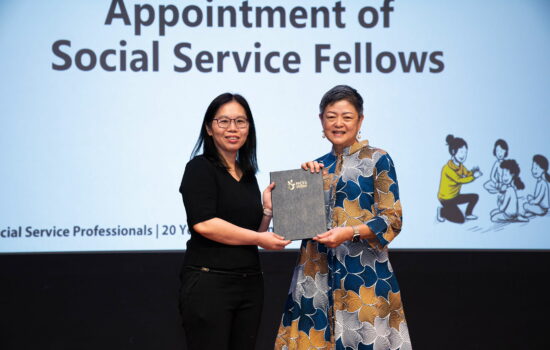Ms Thamaraivalli Narayanan talks about a day in the life of a DAC training officer and what it takes to become one!
After a hectic day tending to the needs of the Day Activity Centre (DAC) clients, Thamaraivalli Narayanan (Valli), a senior training officer, sits down for a chat. These are our unsung heroes, working in the background to ensure their clients receive the best care every day. One of the seven DAC training officers, Valli shared with UPDATES an overview of the roles of training officers at the DAC, and how she became one.
Qn 1: Tell us more about you!
My name is Valli, and I am 32 this year. I have been working at SPD for a good 6 1/2 years now. I entered the field ten years ago!
Qn 2: Ten years! What made you interested in the field of healthcare and the community services sector?
I always had, at the back of my mind, an interest to work in the healthcare industry. I started working soon after my GCE ‘N’ levels and was constantly on the lookout for a good healthcare position in the job market. Back then, there were more and more voluntary welfare organisations (VWOs) being set up and there were a lot of VWOs hiring. I decided to try for a position and landed my first job in the community services sector. It was a stepping stone for me to learn the ropes of being a training officer, and a few years later, I applied for the position at SPD.
Qn 3: What made you choose SPD?
SPD was and still is one of the biggest VWOs in Singapore and it made me feel more secure that I was joining a trusted organisation. Moreover, SPD was willing to pay and invest in my diploma at the Social Service institute (SSI) for a year.
Qn 4: What was it like when you first started on this job?
I was excited, and really wanted to start. I have always wanted to help people with disabilities and as I started working, my passion grew and due to that drive, I was able to learn and adapt quickly, with the help and encouragement of my kind colleagues. Yes, there is a steep learning curve but with determination and a love for your job, those can be overcome.
Qn 5: What are some of the challenges as a training officer?

Valli leading a group of her clients in DAC to a game of Bingo.
I think the most important thing is to know that it takes time to know a client and build a relationship with him or her. Over time, as you get a grip on the clients’ characters and personalities, things become easier. The initial challenge for a new client is always to analyse and understand his/her behaviour.
Other challenges include the management of expectations with regard to caregivers.
As we meet with the caregivers periodically to evaluate the condition and progress of their family members at the DAC, we have to also make sure that the goals that they set for the clients are realistic and achievable. We want to maximise all that we do and allow our training processes to be as productive as possible. With that, we always seek to have a mutual understanding with the caregivers.
Some clients give up easily. We need to put in more effort to motivate them. They might not want to do something or participate in their training activities. During these situations, we try our best to encourage them and slowly bring them back into the training. To be able to do that, the training officers have to know their clients well. Having a good relationship with the clients plays a huge part.
Qn 6: How has the DAC changed over the years?

Valli guiding one client with his computer lesson.
As you can see (Valli points to the new facility), we have just renovated our space and it now looks much more organised and fresh. I have also noticed younger staff coming in as training officers and that is a great thing! The programmes are also more structured now, allowing us to be able to focus on the important aspects of our clients’ training.
I would also like to mention that DAC has seen more corporate and individual volunteers coming in. Due to a change in culture, I believe that the public is now more receptive towards people with disabilities and actually want to help them. It is important for the public to be open to inclusivity.
Qn 7: What motivates you in this job?

Seeing her clients smile gives Valli a lot of motivation.
It makes me so happy to see the clients smile. It is also a comfort to me when my clients are happy to see me. The best thing that can happen in this job is to gradually see the improvements made through the training for an individual and how he or she gets better. These experiences motivate me.
Qn 8: Can you give an example of one such incident?
There was a client who had an accident and came to the DAC with a spinal cord injury. Doctors told him that he would never be able to walk again. Though the diagnosis was clear, the client refused to give up and participated in the training designed for him. Gradually, he was able to use a quad-stick. In time, he was using a one-point stick and right now as we are speaking, he is able to walk and live a normal life.
Qn 9: What would you like to say to encourage aspiring training officers?
Have passion and have patience. As long as you have these two traits, all will be okay. We are not working with machines, we work with people with real emotions. For those aspiring to work as training officers, know that as a training officer, you will experience highs and lows and have to be practical and quick in most of what you do. Ultimately, it is a fulfilling job that has kept me satisfied and happy.
Click here for more information on the DAC or e-mail us if you are interested to learn more about being a DAC training officer.





